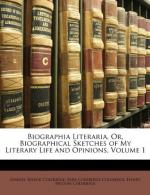
|
| Name: _________________________ | Period: ___________________ |
This test consists of 15 multiple choice questions and 5 short answer questions.
Multiple Choice Questions
1. How does Coleridge compare Wordsworth and Samuel Daniel in terms of diction?
(a) Neither Wordsworth nor Daniel were good at using diction.
(b) Daniel has better diction.
(c) Wordsworth has better diction.
(d) Wordsworth and Daniel are not comparable in terms of diction.
2. What was the first attack that Coleridge made against?
(a) Catholcism.
(b) Christianity.
(c) Calvinism.
(d) England.
3. Coleridge does not think that poetry lends itself to use in which scenario specifically?
(a) Moral language.
(b) Casual language.
(c) Everyday language.
(d) Formal language.
4. Who is not used by Coleridge as an example of uniform and logical English?
(a) Byron.
(b) Shakespeare.
(c) Milton.
(d) Bowles.
5. According to Coleridge, what did Wordsworth give to his poetry?
(a) Meter.
(b) Rhyme.
(c) Metaphor.
(d) Tone.
6. Coleridge says that if poetry is from the poet's sensation, what does the work become?
(a) Feasible.
(b) Amazing.
(c) Sensational.
(d) Mediocre.
7. What does Coleridge describe as the result of both the conscious and unconscious?
(a) Negative knowledge.
(b) Positive imagination.
(c) Positive knowledge.
(d) Negative imagination.
8. Coleridge says that Wordsworth's descriptions come directly from which of the following?
(a) Faith.
(b) Life experience.
(c) Hope.
(d) Nature.
9. According to Coleridge, what did Wordsworth write about mostly?
(a) Hectic life.
(b) City life.
(c) Faithful life.
(d) Rustic life.
10. According to Coleridge, many reviews can be described with which of the following words?
(a) Arbitrary.
(b) Exciting.
(c) Odd.
(d) Helpful.
11. What is the topic of Chapter XVII?
(a) Rustic lifestyles.
(b) Wordsworth's objective truths.
(c) Interplay between passion and will.
(d) Metrical composition.
12. Coleridge describes the first ultimate end of poetry as which of the following?
(a) Fearful.
(b) Faithful.
(c) Hopeful.
(d) Moral.
13. What did Coleridge write when living next to Wordsworth?
(a) Eastern Country.
(b) Old Woman.
(c) Angry Fisherman.
(d) Ancient Mariner.
14. Coleridge says that Wordsworth experimented with his poems by using what kind of language?
(a) Lower language.
(b) Fantastic language.
(c) Dull language.
(d) Casual language.
15. Coleridge says that he often disagreed with Wordsorth, but always interpreted his words in which way?
(a) Ignorantly.
(b) Naively.
(c) Right.
(d) Wrong.
Short Answer Questions
1. Coleridge claims that a great poet must also be which of the following?
2. Coleridge says that meter comes from a state of which emotion?
3. What religion does Coleridge say he observes?
4. What was the name of Wordsworth's experimental poem?
5. Who does Coleridge quote to show that this author is rich in composition?
|
This section contains 365 words (approx. 2 pages at 300 words per page) |

|




